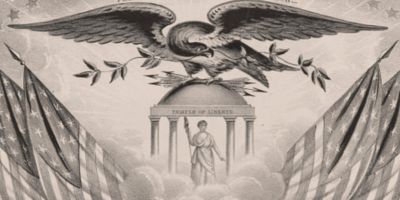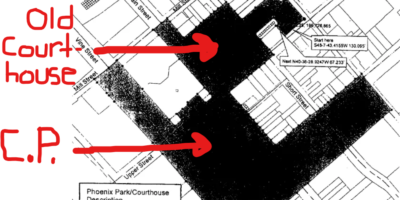By Andrew Battista
This week is the 67th anniversary of the first nuclear bomb attack in human history. On August 6, 1945, a U.S. Air Force pilot named Paul Tibbets flew a plane nicknamed Enola Gay over Hiroshima, Japan and dropped an atomic bomb that instantly killed about 80,000 people, almost all of them civilians. They were burned alive by a fireball estimated to be 1200 feet in diameter, with a temperature as hot as 7200 ºF at its core. In the subsequent months, many more people suffered a slow death, either because of burn injuries or because of the lingering damage caused by radiation exposure. A retrospective report by the U.S. Department of Energy in the 1960s guessed that within five years, over 200,000 people had died from the Hiroshima bomb. Three days after the attack, another 70,000 people would be killed when the U.S. dropped a second nuclear weapon on Nagasaki. The casualties from that attack would also eventually surpass 200,000.
I don’t intend to add to the historical discussion about whether or not the United States should have used atomic weapons to end World War II. Instead, this article is a reflection of how little we remember the atomic bombs today, and how much they reveal about our nation’s foreign policy. The same logic that led the United States to deploy the atomic bombs—the belief that American lives are more valuable than the lives of people from other countries—undergirds our nation’s current global imperial program. Since the middle of George W. Bush’s presidency, the United States has developed a fleet of unmanned aerial vehicles, or drones as they are often called, that are designed to assassinate people without putting the lives of U.S. soldiers on the line. These drones, controlled remotely by ground command forces, are an exercise in power that parallels many of the same problems of the 1946 atomic bombs. The United States entertains the fantasy that it can make unilateral decisions about who lives and dies, all the while waging clean wars in which American lives are preserved and “the bad guys only” are surgically removed from existence.
The fantasy of American exceptionalism notwithstanding, the very use of these weapon technologies by the United States suggests that they can in turn be deployed against us. Just as the threat of nuclear attack in the wake of Hiroshima and Nagasaki became the basis of the Cold War, so too do drone aircrafts open new possibilities for retaliation. Yet many citizens give the President a pass, failing to question how U.S. drone attacks violate international law and create a double standard. The United States’ destruction of Hiroshima and Nagasaki should inform our thinking about how the United States wields military power today. I believe that making a connection between the atom bombs and drones can help us explore our responsibilities as citizens in a representative democracy.
Thinking about the atomic bombs
On Monday morning, August 6, 2012, the Hiroshima community will pause for one minute of silence, a yearly ritual that brings the horror of Japan’s past destruction into focus. Later in the day, Kazumi Matsui, Mayor of Hiroshima, will ascend to the podium at the annual Hiroshima Memorial Peace Ceremony and read a Peace Declaration, a formal renunciation of nuclear weapons that has been the centerpiece of the ceremony since 1947 (with the exception of one year, 1950). Last August, Matsui spoke on behalf of the hibakusha, the survivors of the bombings, and declared a mutual commitment to pursue forgiveness, world peace, and the eradication of nuclear weapons. Matsui also chided the United States for its “subcritical nuclear testing and related experiments,” which continue to undermine his community’s work for world peace.
In the United States, the anniversaries of the atomic bombs draw relatively little fanfare. Some churches and municipalities will hold vigils, and several network newscasts will mention the Peace Ceremony briefly. But by and large, the consequences of the United States’ nuclear attacks are underappreciated by its citizens today.
Why don’t we want to think about the atomic bombs? I suspect it’s mostly because Americans don’t want to acknowledge the consequences of military violence. I gathered a sense of this willed indifference when I started looking through the archives of Barack Obama’s administration. I wanted to see how he has responded in public to the question of what the nuclear attacks mean for citizens of the world today. Indeed, in Obama’s first visit to Japan as President in 2009, a reporter from Fuji Television asked him this very question. The reporter also wanted to know if Obama is a proponent of a nuclear-free world, and if he thinks the decision to drop nuclear bombs on Japan in World War II was morally justifiable. Obama laughed, remarking that Japanese and American journalists are alike in that they lump weighty questions together. But after the laughter died down, Obama confessed that while he shares a vision of a world without nuclear weapons, he doesn’t see disarmament as a likely scenario in our lifetime. When the reporter reminded the President that he had neglected to answer the second part of the question, about whether or not the bombs were morally justifiable, Obama stepped sideways again and moved on to talk of other entanglements in North Korea and Afghanistan.
The question Obama avoided, whether or not it was justifiable to use nuclear weapons, has framed American thinking about the atomic bomb ever since Hiroshima. Rationales for dropping the atomic bomb are predicated on the notion of the value of human life. The idea is that by dropping the atomic bombs, the United States would be able to end the war without having to invade mainland Japan and sacrifice even more American lives. At the time, President Harry S. Truman asked the outgoing secretary of war Henry Stimson to construct an intellectual defense of the bombs to shape public opinion about their deployment. In a 1947 article in Harper’s Magazine, Stimson wrote, “The decision to use the atomic bomb was a decision that brought death to over a hundred thousand Japanese. No explanation can change that fact and I do not wish to gloss it over.” Still, Stimson insisted that the atomic bomb was “our least abhorrent choice [because] it ended the ghastly specter of a clash of great land armies.”
Though Stimson did not want to gloss over the human destruction, his essay does little to suggest that the United States ever seriously considered the intrinsic worth of Japanese people. During the war, the United Stated orchestrated a massive internment of Japanese-Americans into grueling prison camps. Even before the bombs were dropped, a concerted public relations campaign planted seeds in the minds of U.S. citizens that the conquest of Japan was a zero-sum game of revenge. One war poster I found appeals to the resolve of the American people, reminding them that even though the European conflict had ended, we must “stay on the job until every murdering Jap is wiped out.” The logic in Stimson’s essay has influenced discussions about the atomic bombs ever since, yet it is fundamentally misguided. There were many other ways to resolve the conflict aside from atomic warfare.
Democracy and the power of drones
Today, the corollary to the atomic bomb is our ongoing drone warfare campaign. Drones, or Remotely Piloted Aerial Systems, allow the United States to target suspected terrorists. Trained operations forces control aircraft remotely from the United States, gathering intelligence and zeroing in on targets for up to 17 hours at a single flight. A drone system can cost as much as $53 million, a price that has often been justified in light of their benefits. Drones facilitate a kind of furtive military aggression that is not possible in any other way. Without escalating major wars or deploying significant numbers of troops, the United States can dislodge enemy leadership and police the world in the name of fighting terrorism.
Yet like the atomic bombs, drone warfare tactics pose some implicit perils, which U.S. counterrorism chief John Brennan acknowledged recently. According to NPR, Brennan said that “President Obama and those of us on his national security team are very mindful that as our nation uses this technology, we are establishing precedents that other nations may follow.” Brennan continued by championing “responsible use” of drones. But what is responsible use? Even though drones are touted to be efficient, they still have resulted in civilian deaths. More importantly, the use of drones suggests a doctrine of invincibility that just isn’t realistic or moral.
Because we live in a democracy, we have—at least in theory—an obligation to shape the direction of our state by choosing who represents us. This means that even by proxy we are to be held accountable for the things our nation does. Even though the political process of democracy is impossible, we should not let this impossibility exonerate us from our responsibility as citizens.
Eric Beerbohm’s recent book In Our Name: The Ethics of Democracy suggests that complicity is a professional hazard of democratic citizenship. In other words, each person in the United States bears some responsibility for the things our leaders do to other people in the name of one’s country. Beerbohm writes that “when citizens fail to remove lawmakers from office out of willful ignorance or support their reelection on the basis of curated beliefs, they provide accessorial support for injustice.”
Drone warfare, like torture, and like the deployment of the atomic bomb, force United States citizens to examine the suppositions that guide our leadership and our military tactics. All human beings have inherent worth, and the power gained through violence is only fleeting. These are lessons that citizens should thrust into the public sphere as we mark one more anniversary of Hiroshima and Nagasaki.




Jerry
I was told by someone who was there on one of the four ships that were there that the US used a drone to drop the atomic bomb. I was told their were two planes that were there, one was the mother ship (plane) which controled the drone which was the other plane which was not piloted and this drone actuallly caried the bomb. The drone was launched or pulled up from a island that was nearby and was not flowen from the US to Japan. The man is going on 91 this year and has a better memory than i. Now the question is how more is it we were not told about the war? I have more but i don’t think i should put it out here were ever here is (space) on a server someware.